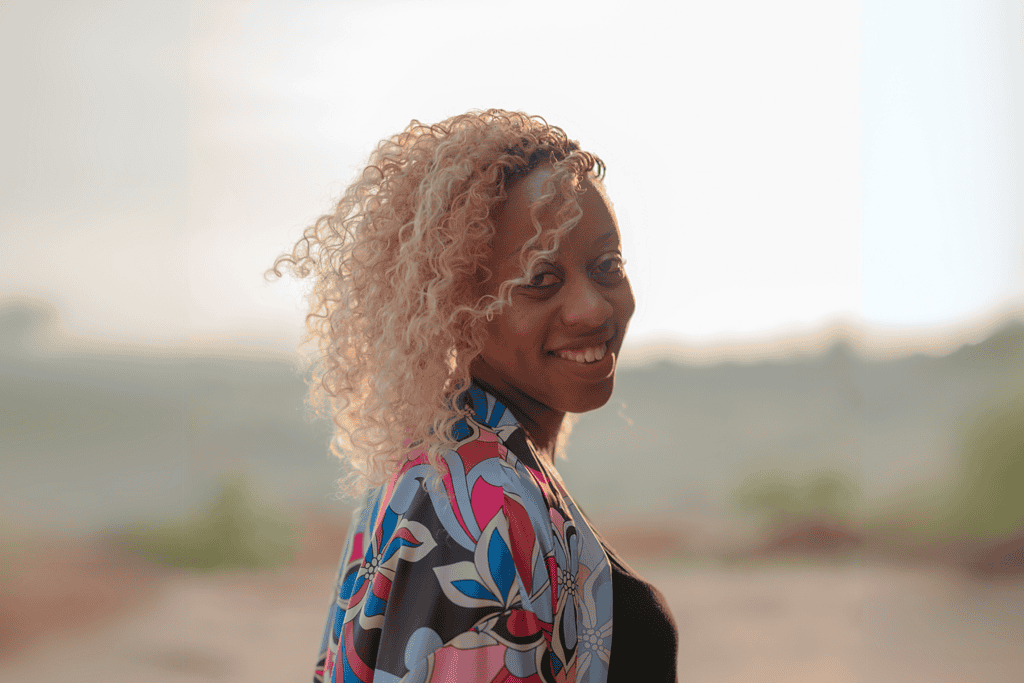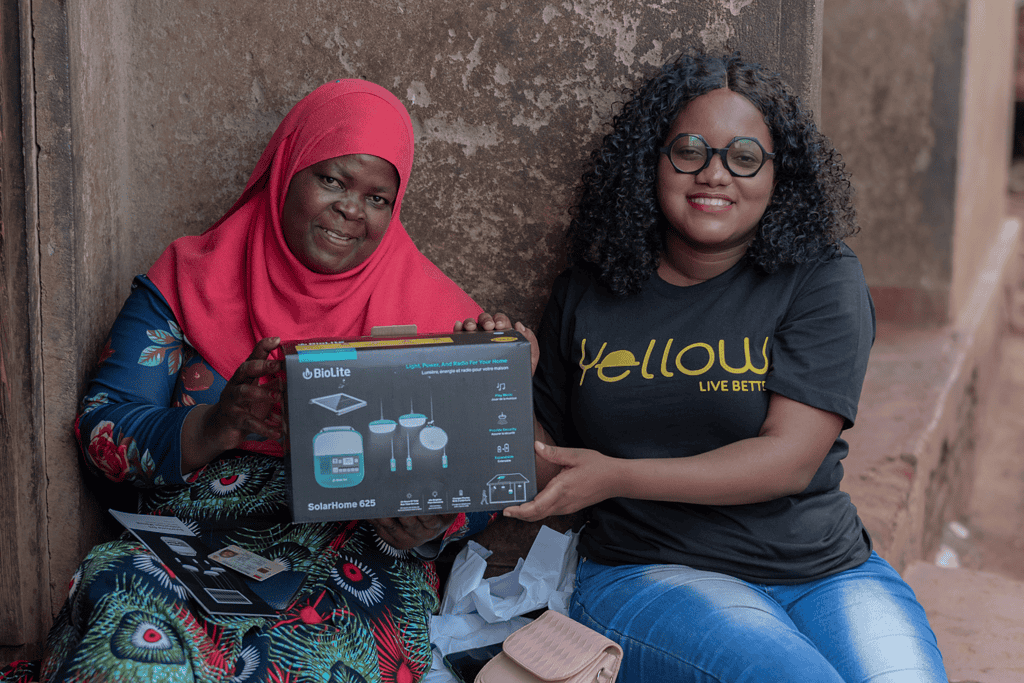Meet the entrepreneur who’s electrifying Africa
Maya Stewart, co-founder of off-grid solar provider Yellow, is a rising star in Africa’s energy sector. She sat down with Acumen for a conversation about her journey as an entrepreneur, her company’s innovative business model, and her vision for a fully electrified Africa.
- Blog
- Renewable energy
- East Africa

When Maya Stewart returned to Malawi with a degree in business from the United States International University in Nairobi, she spent three years looking for a job in finance. As a woman trying to enter a traditionally male sector, she struggled to break through.
“So I was forced to become an entrepreneur at that stage,” she says.
In 2012 she founded the Maeve Project to bring fuel-efficient cookstoves to rural Malawi, where women and girls spend much of their time fetching firewood and working around open fires that fill their homes with pollution. The more cookstoves that Maya sold, the more she was exposed to another problem: The vast majority of Malawians — over 75% — were still living in the dark.
So in 2018, Maya co-founded Yellow, a solar home system and mobile phone distributor that provides energy access to off-grid and rural customers in Malawi. Since its inception, the Acumen Hardest-to-Reach investee has delivered energy to more than half a million customers and smartphones to more than 65,000 people. The company was recently featured in BBC StoryWorks Humanising Energy series.
Below is an abridged transcript of our conversation.
Q: What’s your business model at Yellow and how have you tailored it to your specific market?
Maya: Our business model focuses on affordability, accessibility, and scale. At Yellow, we want to give opportunities to households to have easy access to lighting technology, so we offer solar home systems on a pay-as-you-go basis. The household can pay over a period of 24 months at a maximum. Some households can pay under six months, others can pay 12 or 18. We accept upfront cash payments. We’re very flexible.
When we started the business, we assumed that we’d copy and paste what everybody else was doing in other countries where the off-grid sector was more established. Most of these companies were offering the products on a 12-month basis. But given the extent of poverty in Malawi and understanding our community and the level of income that people were making, 12 months was not realistic. So we changed that model to 24 months, probably the longest in any off-grid provider across sub-Saharan Africa. At 24 months, the monthly payment matches what candles or kerosene lamps would cost. At that point, our business model started making sense to our customers.
Once our customers finish paying off the system, we offer them an upgrade to a solar home TV. That’s a big incentive to keep up with payments. Beyond that, as our model started growing and we were expanding in sales, we realized that a lot of customers are now looking to transition from feature phones to smartphones, so they could enter the digital space. So we’ve built smartphones into our pay-as-you-go business model.
Q: What role have impact investors like Acumen and others played in your growth strategy?
Maya: It sometimes pains me to see that a lot of investors would rather not invest in countries below East Africa, but it’s the reality that we have right now. We have to be innovative — come up with different ideas, different financing models. We don’t have access to foreign exchange reserves. That’s why investors like Acumen are so important. They come in and support local companies, whether they’re growing companies or even fully mature companies, with the funding in the form that they need. Right now we are looking for funding that is completely new in the market; so US-based loans that you pay back in local currency. Not many investors would want to do that. But Acumen did. As we speak, we’re repaying our loan in local currency.
Africa is going through challenges. For example, recently we did not have fuel in Malawi for almost three months. That tells you how bad it is. But at the same time, if everything were to stop because there’s a crisis, that means we will not be meeting our consumer demand, which also means our agents are not making an income. There’s a lot of people who rely on our company and our team. As a businesswoman, it’s my responsibility to look for innovative means and ways to get funding into the country. Acumen is the ultimate partner in that respect.
“That’s why investors like Acumen are so important. They come in and support local companies … with the funding in the form that they need.”
Maya Stewart, CEO and Founder, Yellow
Q: How has having access to off-grid solar impacted low-income households in Malawi?
Maya: When you give people access to lighting, it leads to more opportunity, especially for women and girls. At Yellow, a lot of our customers are tailors. You cannot make a dress or sew shorts or a trouser in the dark, but the moment you give them access to lighting, they can, which allows them to make more income. Their children can finish their school work and stay safe at night.
You’d be surprised at the impact that we have from a social perspective. Seeing other women within the community growing together, having access to energy, clean cooking, and more money, everybody starts to help each other. It becomes an ecosystem within the community, within the village. Women put money together. They create village savings accounts, and then they invest or lend the money to their friends who can increase their business activities or pay their school fees.

Q: I’m sure one of the most rewarding parts of your job is meeting customers in the field and seeing the impact up close. Do any stories stand out?
Maya: I visited one customer who had paid off his solar home system and gotten his TV set and was surprised to see that he was using the lighting in his home, but the TV was outside. He told me, “I decided to create a video hall. I can’t just have the TV in my house alone. Everybody else in my community should also be able to enjoy this. But I make money off of it. I’m charging them.” So I’m like, “Charging your friends to watch TV?” And he says, “Yes, I am. If they want to watch TV, they must pay for it.” He went on, “I’m working much harder now so I can get a second TV and take it to another site. So many people from around the community are coming to my house, my TV den is too full!” I found that quite interesting and innovative and entrepreneurial.
The most touching story was a woman who had a special needs child. Her child was deaf. Before light came into her house, her child was always having anxiety attacks at night. She bought the solar system so that she could leave the light on the whole night. That way, when the daughter would wake up, she wouldn’t have an anxiety attack as a result of not seeing what’s happening. Her daughter now sleeps through the night and she can sleep better at night too. Before, she was waking up three or four times at night trying to calm the baby.
Q: What advice would you give other entrepreneurs who are interested in entering Africa’s energy sector? How important has resilience been to achieving success?
Maya: The key to resilience comes from within. There’s no other place you’ll find it. It’s not just sitting on a shelf. Luckily, we are Africans, and Africans are resilient. The challenges we overcome on a daily basis give us the character we need to succeed. I mentioned that we’re in a fuel crisis. There are times I’ll sit in a fuel queue for hours while I could be at home being productive. So instead I carry my laptop with me. I carry a charger that can connect to the car charger, and I keep working from the fuel queue.
If I was to give advice to other people in the energy sector: Yes, Africa’s market is still in its infancy compared to the West. But the West also took a long time before they got themselves to where they are today. They’re comfortable now because all the hard work was done by somebody else. Today in Africa, we are those entrepreneurs. We’re the people who are doing the hard work. Come join us. I’m always telling people, come to the market!
The off-grid sector is one of the fastest growing in Africa. Solar mini-grids are a huge opportunity to reach the business sector. We’re always the first of everything in Africa. The same way we embraced mobile money back in the 2000s. In the future, we will be the first to electrify an entire continent with a majority focusing on off-grid electricity as opposed to grid connections, which means we’ll be the biggest consumers of renewable electricity worldwide. That is my vision.